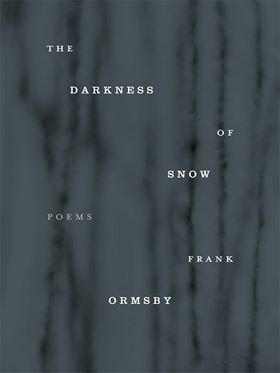Interview with 2018 NBCC Poetry Award Finalist Frank Ormsby
For the past four years, the National Book Critics Circle has partnered with The New School’s MFA Creative Writing program, allowing the students to interview each of the NBCC Awards Finalists. In addition to building excitement for the Awards Finalist Reading and Ceremony held at the New School March 14th-15th, these interviews have built an intergenerational bridge between the writers of today and tomorrow.
This year, as part of the ongoing collaboration, and in support of the NBCC’s conversation about reading, criticism, and literature that extends from the local to the national, Brooklyn Magazine will publish and promote the interviews between NBCC Finalists and the current students of The New School.

When I was in kindergarten, my family moved from an apartment to our first ever house, and my very first yard. A giant rhododendron had been growing for years before we got there, and it was immediately my own personal world, big enough that I could climb underneath and hang out for hours. Before we get into a few other questions about your lovely poems, I would love to just start out talking about Rhododendrons, if you could just talk about where it came from, why you chose to honor such a beautiful but scrubby plant, what special place it holds.
I grew up in a rural area of County Fermanagh in Northern Ireland, near a village called Irvinestown. My mother’s family owned a small farm and we often helped with the farming work. Close by was Castle Irvine (sometimes called Necarne Castle), which was uninhabited but surrounded by a larger farm and extensive woods.
As children, we played in these woods. The half-mile avenue from the gate to the castle had trees on both sides, mostly rhododendrons, which were popular on the larger estates. So farmland and trees made up my essential landscape. No mountains or rivers of any size. However, look for Co. Fermanagh on a map of Ireland and you will see that Lough Erne seems to cover the whole county. We lived some distance from it but did not own a car, so the lough did not figure prominently in my boyhood. I think that my rural poems are an attempt to recover the sensuous aspects of growing up in the country—the sights, sounds, smells, tastes, and textures of my world. I would want the reader to experience that world vividly. The way you have experienced the rhododendrons.
Do you find yourself consciously or unconsciously drawn to elevating ordinary things and experiences to the extraordinary?
I do have the impulse, both consciously and unconsciously, to discover the extraordinary in the ordinary. This impulse is often the intensity that generates a poem.
We have to talk about the completely wondrous section on painting because, wow. This kind of concentrated examination that involved multiple voices was something new to me and I absolutely fell head over heels for it. Was it a conscious decision to write from so many perspectives?
Paintings have this effect on me also. The twenty-six included in “The Darkness of Snow” all prompted poems. I did not have to force inspiration. The use of multiple voices was also spontaneous. The poems assumed their voices without much pressure from me.
To speak from someone else’s point of view is, creatively, a healthy challenge. It is likely to close the gap between speaker and reader and increase the immediacy of the poem.
I actually fell so in love with Norman Garstin’s “Madonna Lilies” that I had to look it up on the internet. Can you talk a little about the process behind this poem in particular?
One of the most satisfying aspects of writing poetry is that, sooner or later, you find yourself producing a poem that does not seem quite yours; that takes on a life of its own. Examples from my earlier book are “Apples, Normandy, 1944” and “Bog Cotton” – “Madonna Lilies” by Norman Garstin is in this category. It still reads for me like a poem written by someone else.
There is nothing I can usefully say about the process behind the poem, except that it is humorous, and that it has a certain impetus that kept renewing itself as the poem emerged. It is a kind of secular prayer in which desire and purity are played off against one another, creating both pleasure and discomfort in the speaker.
I noticed that there are quite a few shorter poems in this collection. How do they differ for you as compared to longer poems, in terms of process or purpose?
I’ve always had a taste for the shorter poem, particularly as practised by the haiku poets of China and Japan. Michael Longley had been a major influence in this respect and when I revise a poem these days, it is usually a matter of cutting. I now have a section in each collection, called “Small World,” which is the haiku section. There is probably no point in comparing very long and very short poems. I suppose that, in some ways, forms like haiku are somewhat limited, yet the ambition to write a perfect haiku is about as ambitious as you can get.
You are a master at using humor in your writing, and you use it beautifully in The Parkinson’s Poems. I love the very first line of the entire section in Agitans, “My left arm is jealous of my right, the one without a tremor.” To what purpose do you find yourself using humor in your writing, and in this section of poems?
Black humour is evident in all my books. Reviewers seemed to find the earlier books death – absorbed and grim, choosing to ignore the comic elements. They have become more aware of this strand and the sequence of “Parkinson’s Poems” in particular seems to have got them smiling. That was the intention. I had a strong sense of the effectiveness of black humour as an antidote to disease, pain, depression. It also counters turgidity and the kind of po-faced seriousness, which is among the enemies of lively poetry.
What finally brought you to writing poems about your experience with Parkinson’s? Do you find writing about Parkinson’s helpful personally, or do you write for the reader in these poems?
There is a kind of pressure that brings itself to bear on some aspects of your experience but not others. In 2009, I spent three weeks in the hospital with heart failure and felt no pressure to write about it. Two years later I was diagnosed as having Parkinson’s disease and began writing about it immediately. Why?
Whatever the reasons, I found the Parkinson’s poems flowing freely, requiring little revision on the whole. The experience of writing the poems gave me a sense of being in control of my life. Even if that is an illusion, it can be an enabling one.
I love the paradox of the title. How did you settle on this line as the one that would lead you to the title of the entire collection?
You’ve got the answer in the first part of your question! Paradox comes closest to embodying the complexities of things. As a mode of expression, it is usually compact and memorable. The book has five very different sections so it was impossible to come up with an appropriate cover design and title. When I thought of “the darkness of snow,” I was so pleased with it that I let it stand. It suggests that what is attractive and beautiful in the world is never entirely without its darker, uglier side.
What is your day to day writing process? Do you find you work better at a certain time of day, after a certain routine?
My wife is a full-time teacher and I have been retired for eight years. This means that most days I have the house for myself from approximately 9.00am to 3.30pm. I work obsessively (one of the side effects of medication) on poems or read a little. There are very few parts of the day when I am not working on a poem, either at my desk or when I go walking in North Belfast.
My Belfast landscapes are Cavehill, which looks like a face-profile and is known locally as Napoleon’s Nose, and the Waterworks Park. Since 2015, I’ve had the most productive period of my life. Again, I am drawn to speculate that my various illnesses—diabetes, sleep apnea, Parkinson’s Disease—have produced a kind of urgency. Not exactly a sense of time running out, but certainly a desire to get whatever poetry is there down on the page.
Who are a few other Irish poets who you’re drawn to, and whose work you feel has informed your own?
Among the other contemporary Irish poets to whose poetry I am attracted are Michael Longley, Derek Mahon, Paul Muldoon, Ciaran Carson, and Paul Durcan. This is not an exhaustive list. I’m reading the latest collections by a number of younger Irish poets e.g. David Wheatley, Conor O’Callaghan. I enjoy detective fiction and am planning to catch up with some of my favorites: Jams Lee Burke, Sue Grafton, Donna Leon and Ian Rankin.
What do you do when you’re feeling stuck?
It’s been years since I’ve had that experience but if I did find my inspiration “totally blocked” I would probably dip into the work of poets who have been an inspiration from the start—the New Zealand poet Fleur Adcock, the English poet Hugo Williams, Michael Longley, Seamus Heaney, various haiku poets. I might turn to poets such as Billy Collins and Wendy Cope for their humour and lightness of touch. Or I might leaf through my poetry notebooks in search of unfinished or discarded poems that can be salvaged.
I read somewhere that you used to listen to Elvis with your sisters. Can we just talk about Elvis for a second? I’ve recently been watching old Elvis movies and they’re so fascinating. The soundtrack to “Blue Hawaii” is constantly on in our home.
The first radio that we had in the house was provided by a welfare organization after my father had had a stroke. He listened exclusively to Irish music and Irish singers on the Radio Eireann station and despised rock ‘n’ roll. When he went to bed, we listened, with some excitement, to Radio Luxemburg—Little Richard, Jerry Lee Lewis, The Big Bopper, Buddy Holly and of course, Elvis. My father’s verdict on Elvis was “That boy can sing none.”
You might also like 


























